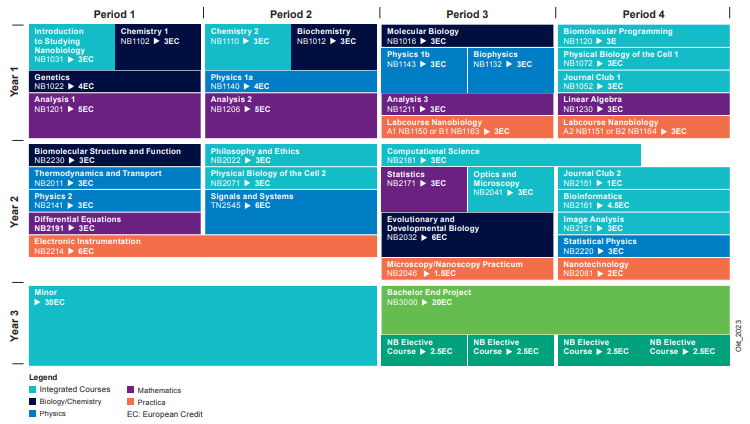What will I learn?
Mathematics, physics and biology are broad fields. In BSc Nanobiology physics you will learn among others: movement, optics, biophysical phenomena. Biology will include cell structures, function, development. Plus computational including bioinformatics, image processing and modeling. You will also learn the mathematics, programming and lab skills necessary to fully understand nanobiology.
Besides mathematics, physics and biology, you will also gain a broad foundation in chemistry during your studies.
Nanobiology will enable you to contribute to improving society by addressing challenges in the field of medicine, energy and food.
Structure of the programme
This programme is generally perceived as tough and challenging. Approximately six hours per day are scheduled for lectures, tutorials and practicals.
Most courses are 10 weeks long and many of those include a midterm in week 5. A few courses are 5 weeks long (in 2024-2025, this will change in 2025-2026). Besides a written exam, they often include additional assignments and projects necessary to complete the class. Some courses are completed by doing a project or presentation, not a written exam.
Approximately 50% of the contact time is in Delft and 50% in Rotterdam. The timetable is designed to avoid needing to travel between the universities on one day.
The study consists of several learning objectives. Every student follows the first learning objectives mentioned (year 1 and year 2). These are the practicals and the core subjects.
- Practicals
- Labcourse
- Electronic Instrumentation
- Microscopy/Nanoscopy
- Nanotechnology
- Core subjects
- Biology/Chemistry
- Physics
- Mathematics
- Integrated courses
The last mentioned learning objective (year 3) is the specialisation and can be completed freely by the student.
- Specialisation
- Minor
- Bachelor End Project
- Elective courses
In the first year, you will lay the foundations of your knowledge. You will take courses in evolutionary biology, advanced mathematics, calculus, linear algebra, physics, biophysics, genetics and biochemistry. You will have the opportunity to work with a computer programme that simulates biological systems, which will assist you with your research projects throughout your study. The courses emphasise the relationship between principles of health and disease.
In the first semester of the second year, you will further expand your knowledge in mathematics, physics and biology. This and all the knowledge you gained in the first year forms the foundation of the second semester courses in year two. From this point on, you will be taking ‘integrated’ courses, which focus on different specialisations. You will explore the relationship between physics and biology through courses such as optics and microscopy, image analysis and bioinformatics, and nanotechnology.
The third year is a specialisation year. This can be completed freely by the student with the choice of a minor, various elective courses and the Bachelor End Project (BEP) where you conduct research in the laboratory.
-
In Semester 1 of Year 3 of the BSc programme you will have the opportunity to spend five months broadening your horizons and exploring a subject that interests you, in the way that suits you best. This could be a cohesive unit of modules, or a self-composed minor. You can choose a minor that deepens your knowledge, or rather broadens it. You can also choose to do a minor abroad. A well-chosen Minor can help you to find the career direction that suits you, or to discover which Master’s programme you would like to take after your BSc programme.
-
In the second semester of the third year, you take 4 electives. You can choose from:
- Computational Neuroscience
- A Primer in Neuroscience
- High-speed Scientific Computing
- Quantum Mechanics for Nanobiology 1
- Quantum Mechanics for Nanobiology 2
- Molecular Motors
- Genomics Technology in Breast Cancer Research
- Optics and its Applications in Nanobiology
- Epigenetics
- Human Complex Genetics
- Advanced Math Topics
- Writing a Bachelor’s Thesis in English
